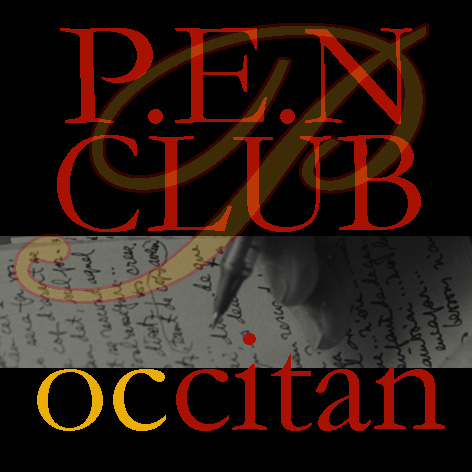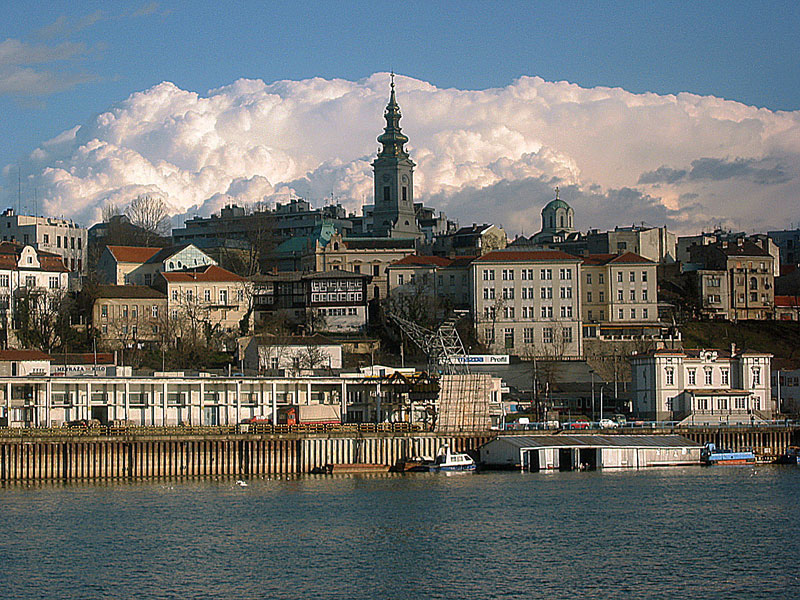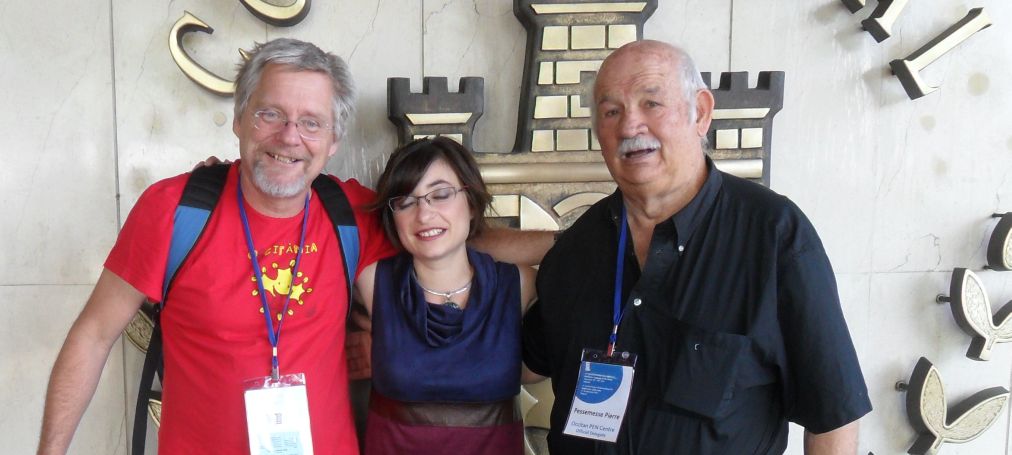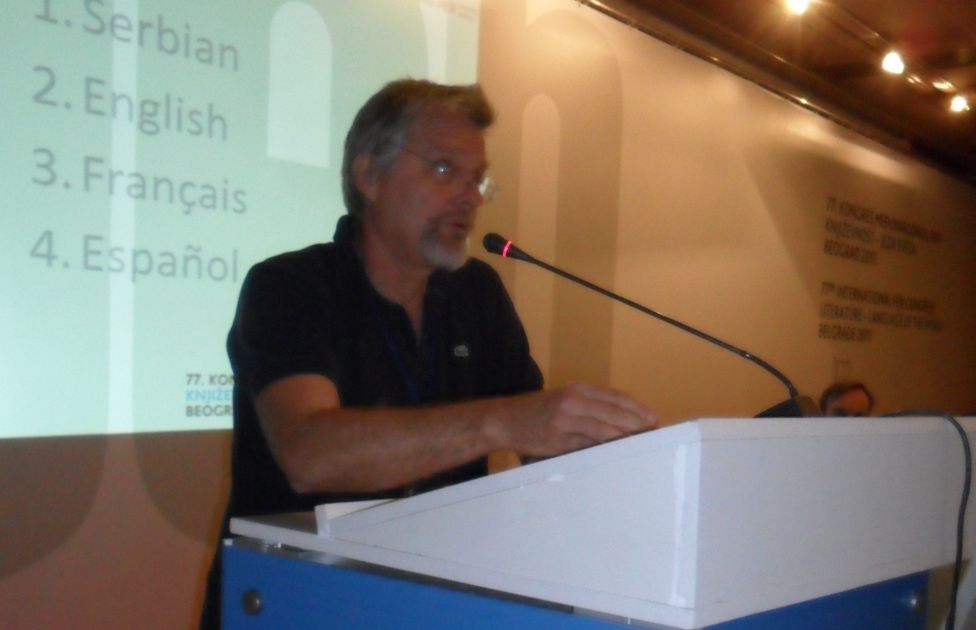
Lo
congrés del retorn dels occitans !

77th
INTERNATIONAL PEN CONGRES
Literature
– Language of the World
September 12th - 18th, 2011
Belgrad, Sèrbia

16 de Setembre de 2011, 12 oras. Lo PEN Club occitan es estat acceptat a l'unanimitat coma seccion dau PEN Internacional, davant l'Assemblada Generala, au congrès mondial de Belgrad. A comptar de uòi sèm pas mai una lenga "Regionala", sèm una de las lengas de cultura dau mond. La delegacion occitana èra compausada de Joan-Frederic Brun, Pèire Pessamessa, Aurelià Lassaque.

Aquel congrès es estat un congrès important dau PEN. Ongan dos membres dau PEN an recebut lo prèmi Nobel : Mario Vargas Losa e Liu Xaoban. Lo PEN es tanben estat a las prumièiras linhas, amb sos escrivans engatjats, de la revolucion pacifica qu'a escobat lo dictator Benalí en Tunisia, mentre totes los govèrns de la tèrra los consideravan coma un cap d’estat respiechable. Tot aquò es explicat dins lo discors de dobertura del president internacional del PEN John Ralston Saul. E s'es votada en acamp plenièr la resolucion dels dreches linguistics alestida a Girona. Es ara una declaracion plenament oficiala dau PEN e serà portada a l'ONU. Document fòrt, sens concession, per far croissir las dents de nòstres afeccionats amics jacobinistas. Vos rapèle que los occitans ne son signataris, e vos n'aviái mandat lo tèxt occitan tre la fin de l'elaboracion dels tèxtes oficials (anglés e francés). L’atrobatz sus aqueste sit.
Fonhem pas nòstre plaser, es estat tot un trabalh, i avèm trempat la camisa. Es una victoria per nòstra cultura. Parlem pas de la consideracion qu’an per nos a París o quitament dins lo « miegjorn », mas tanben a Londras au centre administratiu dau PEN, d'en primièr quora los contactèrem cresián qu'aviam tot simplament disparegut. Una lenga de mai dins lo traucàs. E ben nani. Avèm capitat de los persuadir dau contrari. Cau afortir cossí ne sèm devents a Sylvestre Clancier president dau PEN francés e a Audoard Kovacs president dau PEN eslovèn qu'es a mitat tolosenc. L’actitud dau PEN francés resolgudament favorabla a nautres es de joslinhar. Trenca amb aquela de la França oficiala. Mòstra çò que pòt èsser una concepcion umanista de la Francofonia, opausada a la francofonia-kärcher que vesèm sovent a l’òbra.
Sèm donc au PEN un rodelet de « minoritaris » plens d’estrambòrd e uroses de trabalhar ensèms. Nos retrobam cotria amb los Catalans, los Bascs, los Galicians, lo Quebec, los Kurds, los Oigors. Nos sèm totes abraçats: nos cau collaborar d'a fons.
E caudrà pas s'arrestar aquí. Vos rapèle que l’idèa es de far participar lo mai grand nombre possible dels escrivans d'òc qu'o vòlon a aqueles rescontres entre las culturas dau mond, ont tanben se pausan las questions brutlantas de las injustícias dau mond d’ara, e que s’i pòt influir dessús quora una ONG tant importanta fai de declaracions. Los congrèsses varioses dau PEN son pas exclusivament reservats au burèu. Nos cau tirar tot lo ben que podèm d'aquela vitrina internacionala ont sèm desenant e ont nos cau demorar.

La dicha dau president dau PEN club occitan per demandar l'integracion dels occitans
"All
that is too moving and to avoid being too emotional I will continue in English.
I am extremely grateful to Sylvestre Clancier and Edouard Kovacs for introducing
me so warmly. Many thanks also to
all of you that so warmly welcomed us. I give a special mention to our sister
country, Catalonia. Thank you dear friends.
I
will present you our project of a new Occitan PEN Centre, which is actually
nothing but the revival of a 50-years old Centre that became dormant.
And then was closed.
Our
centre is defined by a language. Occitan, or "Langue d'Oc", is the
historical romanic language of a large area that covers all the south of France
(almost one third of the total surface of France) and little parts of Italy and
Spain. In Italy and Spain it is officially recognized and supported, but in
France it was until the last years barely tolerated.
This
language has generated an important literature, since more than 1000 years, with
more than 1000 authors. In the middle Age it was the civilization of
Troubadours, the poets of Pure Love, some of them being women, great poetesses
called trobairitz.
Due
to the French conquest this civilization collapsed and our language became a
minoritary one. However it never stopped to be written until today. We had the
honour to win a Nobel prize, probably the only for such a minoritary language,
that was given in 1904 to our great poet Frederic Mistral. And Mistral's work
gave a stronger impulse to our revival. He was followed by great writers who
made Occitan a truly modern language able to express all the new concepts of our
time.
In
1963, an Occitan PEN centre was founded and participated actively during 40
years to the PEN meetings but it became dormant after 2003. I will give you the
explanation. At that time the situation of our language was tremendously
worsening, less and less people were speaking it, it was banned from school,
there seemed to be no place for it in the modern French society.
Today
the situation is quite different. Due to our efforts to reverse the feeling of
shame that was attached to this language and to make people proud of it, there
is a wide pacific raise in interest for our language. Two years ago we were
25000 in the streets of the historical city of Carcassonne to claim for saving
our language. Such claims are not well received in Paris, where they are rather
a matter of laugh and joke, but a very important symbolic advance occurred:
France included in its Constitution what they call "regional languages",
including ours.
According
to official studies, today, among 13 millions people living in this area, only 2
to 3 millions are able to speak or understand it. In some very touristic parts
of our country it is no longer used. However, there is a good support for
edition from the Regions, so that literature develops well, with an increasing
number of readers that never existed until the last 10 years! We have three
literary journals that have a quite good standard. Schools even if they are too
few, offer now the possibility to learn Occitan. The shame declines and people
are more and more proud to belong to this culture. Literature remains our
strongest aspect, but the decline of language is truly reversing. But this
reversal is for us a difficult challenge...
This
is in this context that we made the project to ressuscitate the Occitan PEN
center, with all interested writers and cultural actors from all occitan regions,
including the French ones
(Languedoc, Provence, Gascony, Limousin) and the Italian and Spanish ones, on
the basis of the full respect of their diversity, which we consider as a
richness. As writers, we were isolated over a wide country and we needed to be
more united, to exchange, and to share projects. On the other hand, we had the
feeling that it was essential for us to meet writers from other countries, to
learn from them and to exchange with them. Even more, we expect that being in
the PEN will help us to put our literature over the international scene,
at its true place which is that of a very old culture, still alive, with all the
flaws of a minoritary one. Not a
local folkloric remain of the past, but one of the living cultures of the world.
Our acceptance in the PEN family would be a very strong sign of respectability
for our culture.
Our
group meets twice a year, in different cities of eastern or western Occitania,
and attendance to our meetings is increasing. There are around 30 very regular
and enthusiastic participants from France, Italy and Spain, and we make in each
meeting one or two workshops on specific subjects like translation, our
relationships with our language, literature and song, etc... We, as Occitan
group wanting to be a PEN center, were oficially involved in several cultural
events, including the board of the International Ostana Prize given in Italy to
authors in minoritary languages. We participated to several PEN events like the
first meeting of the Mediterranean PENs organized by the French PEN in Arles,
the German-French meeting in Sanary, and the Girona workshop where was
written the Manifesto of Linguistic Rights and we are extremely proud to appear
in the list of centers that participated to this workshop. We love this PEN
ambiance and would be very glad to continue partipating in this adventure.
I
am an optimistic man. I really believe that our culture has a future and will
still be alive in the next century, and still producing an beatiful literature.
We are the proof that it is very difficult to eradicate a language, and being
represented in international PEN will be greatly helpful for us to continue and
extend our revival.
For
this reason, if you accept us in the PEN family, you will fulfill a major
expectation of Occitan writers. I promise you that we have really the will to
participate very actively to the activities of PEN. Simply, for us, being
accepted among you will be like breathing a new air, full of oxygen, that will
give us much more energy for our revival. "